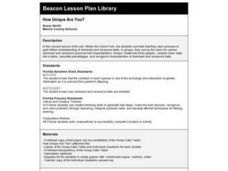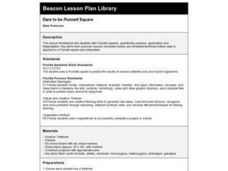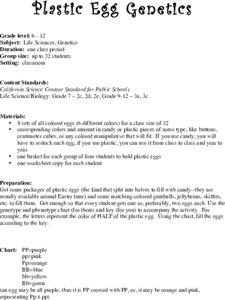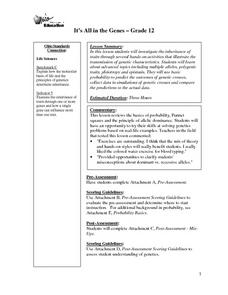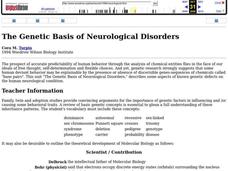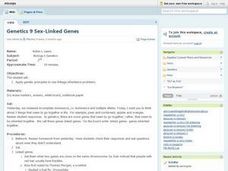Curated OER
Genetics
In this activity, students will answer 4 fill in the blank statements about Mendelian inheritance and meiosis. Then students will use Punnett squares to answer three short answer questions. Students will match 8 genetics vocabulary words...
Curated OER
Mendel Pea Plants
In this Mendelian genetics learning exercise, students answer a variety of questions about Mendel's experiments and discoveries and they practice determining probability of outcomes in pea plants.
Curated OER
It's in the Genes!
Help your students discover more about themselves with these great lesson ideas involving heredity, genetics, and Punnett Squares.
Curated OER
Gene Action and Mutation
Students review terms related to DNA structure and function. They complete a variety of worksheets in small groups or in pairs reflecting the unit's concepts regarding DNA. They submit their worksheets for grading.
Curated OER
Genetics Crossword
In this biology activity, students complete a crossword puzzle with 38 questions on genetics. They identify the different parts and functions of a flower.
Curated OER
Real Family Genetics
Students research genetic disease and mutation causing traits in family pedigrees simulated in a class activity. Students are each assigned a genetic trait and a "spouse" and must conduct research on their traits and the probability of...
Curated OER
Yeast - A Dihybrid Cross
Young scholars make a yeast dihybrid cross and follow two forms of each of two traits: red growth versus cream color, and tryptophan-dependent versus tryptophan-independent.
Curated OER
Modeling a Gene Pool
In this genetic activity, students examine how gene frequency changes in a population of organisms. After completing 5 pre-lab questions, they work in pairs to collect data and answer 5 additional post-lab questions.
Curated OER
Using Blood Tests to Identify Babies and Criminals
Students solve a crime by matching a suspect's blood type to physical evidence collected at the crime scene. In this forensic science lesson, students identify the different blood types. They explain how blood tests work.
Curated OER
How Unique Are You?
Students explore how genetic information is passed down from parent to offspring. Because of this, they examine how this causes the variation in each species.
Curated OER
Dare to be Punnett Square
Eighth graders become familiar with Punnett squares, specifically purpose, application and interpretation. Key terms from previous lessons (included below) are reviewed/reinforced before data is applied to a Punnett square and interpreted.
Curated OER
Cancer as a Multistep Process
Students analyze the causes of cancer from a genetic standpoint. They explain the increase in cancer with age and create a hypothesis for cancer development. They use the laws of probability as well.
Curated OER
Plastic Egg Genetics
Students are introduced to the concepts of genetic dominance, recessiveness, related terms, Punnett Squares, etc.
Curated OER
Diversity and Adaptation
Tenth graders explore structure, function and variation among species. Through field observations, lab activities and homework, 10th graders observe and record examples of adaptation and variation.
Curated OER
It's All in the Genes
Twelfth graders investigate the inheritance of traits through several hands-on activities that illustrate the transmission of genetic characteristics. Students study advanced topics including multiple alleles, polygenic traits,...
Curated OER
Transcription, Translation, and the Genetics of Microbes
Learners construct various virus models using Fruit loops and Alphabits to represent nucleotides and molecules. They constructs capsomeres using shoes as the capsomeres and discuss various viruses.
Curated OER
Apoptosis: Programmed Cell Death During Development
Students model the plasticity of neural pathways for memory in the brain. They simulate the cell activity according to dots on cards that they are given. They complete various simulations of different cell combinations.
Curated OER
The Genetic Basis of Neurological Disorders
Young scholars explore neurological disorders. They examine the presence and absence of discernible genes. Students describe neruological diseases and draw faces of affected persons. They play a human neurology disorders learning game.
Curated OER
Heredity (Mendelian Genetics)
Students observe and record observations of whether a person is a taster or nontaster. They test selected individuals from their families and peer groups and chart all findings to determine which trait (e.g. taster or non-taster) is...
Curated OER
Square Dancing
Fourth graders investigate the concept of using punnett squares in the determination of the offspring.They collect drawings and pictures and create a collection for student science journals.
Curated OER
Sex-Linked Genes
High schoolers review the concepts of incomplete dominance, co-dominance and multiple alleles. As a class, they are introduced to the concept of sex-linked genes and how they are passed to offspring. To end the lesson, they examine...
Curated OER
Genetics
Students explain the difference between dominant and recessive genes, identify what causes differences in the traits of parents and their offspring, and explain how sex is determined. They will also improve their reading and...
Curated OER
History of Theory of Evolution
Students infer evolutionary relationships by comparing the physiological data or description. They write what they think would happen if a brown bear in the woods had an offspring that was white. Would this help the baby bear in its...
Curated OER
Human Genetics
This is a worksheet regarding human genetics where students can poll the class regarding specific traits.









